#educational equity
Text
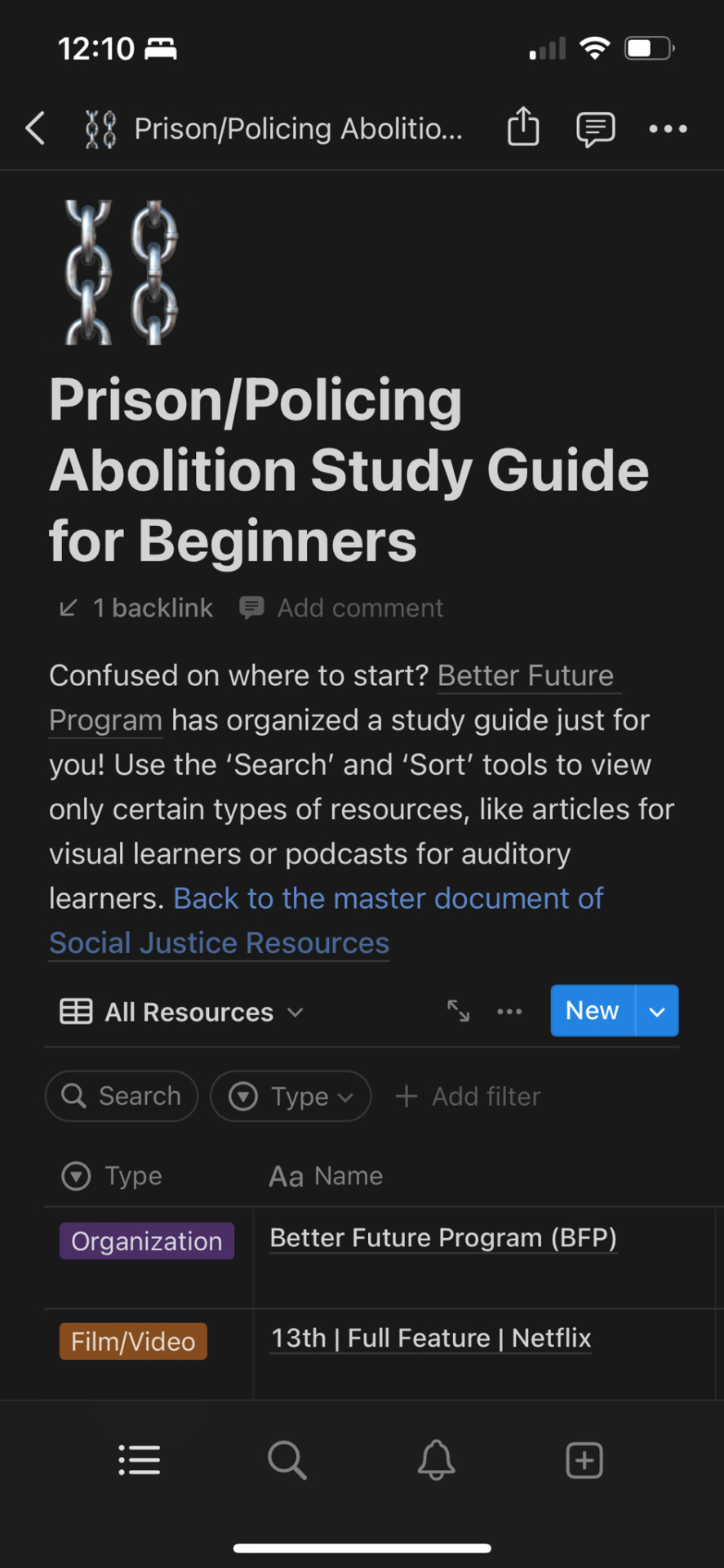
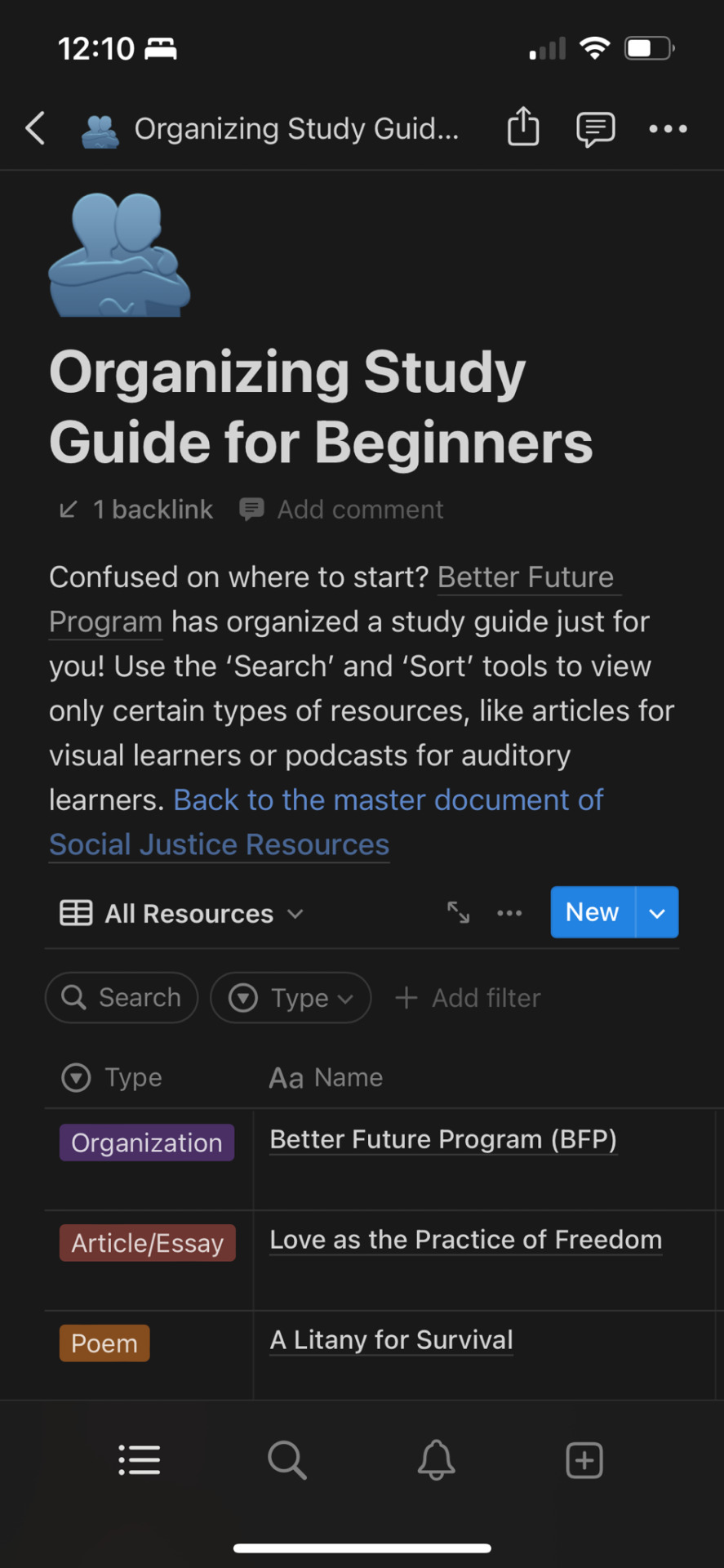

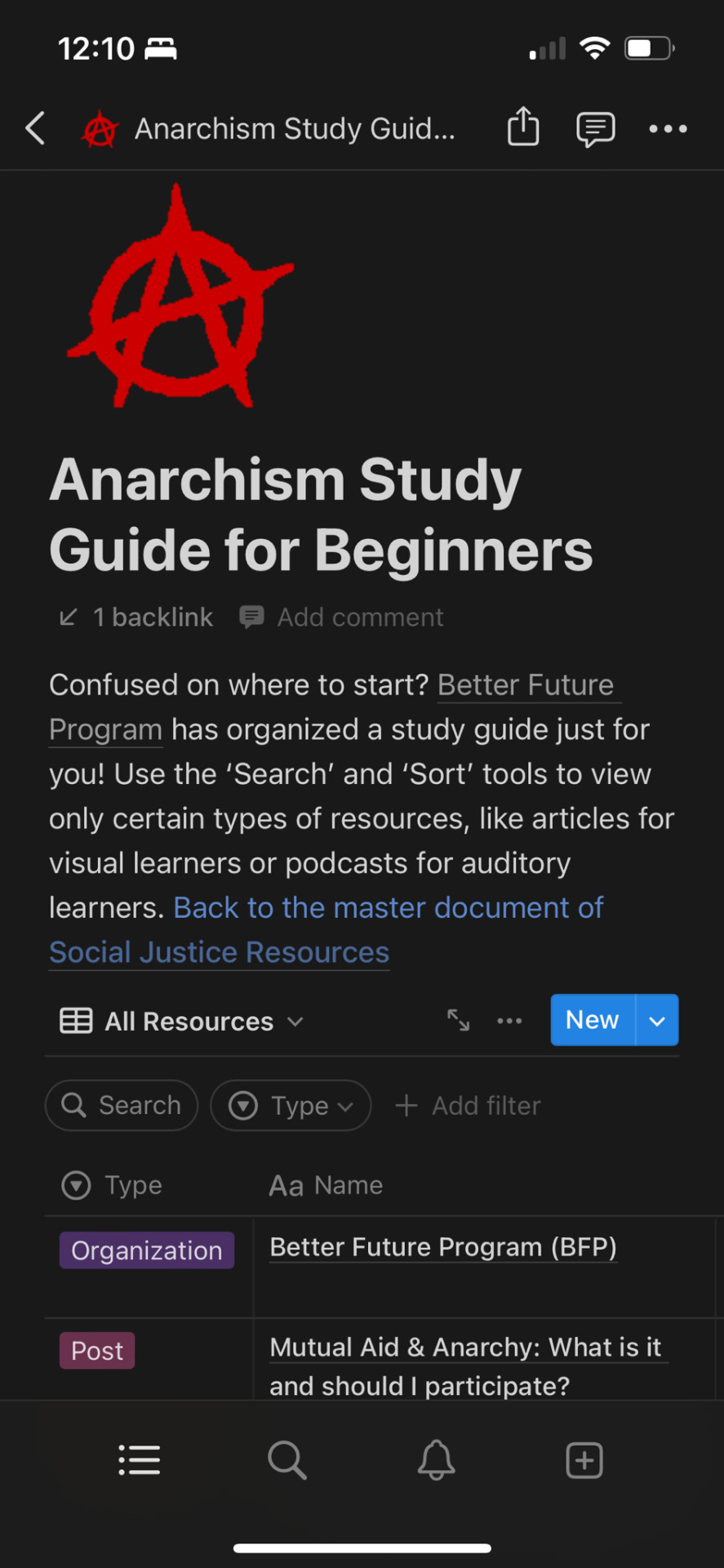
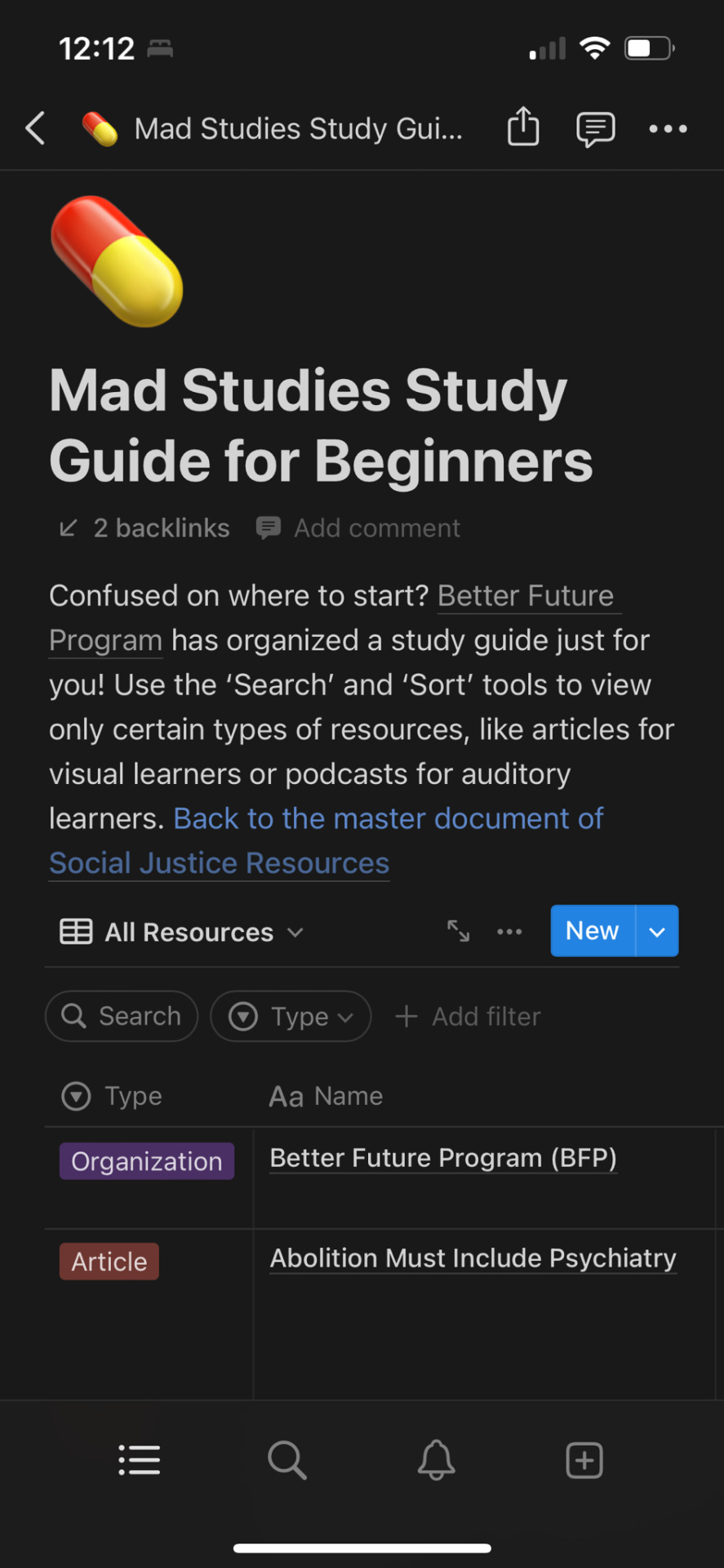
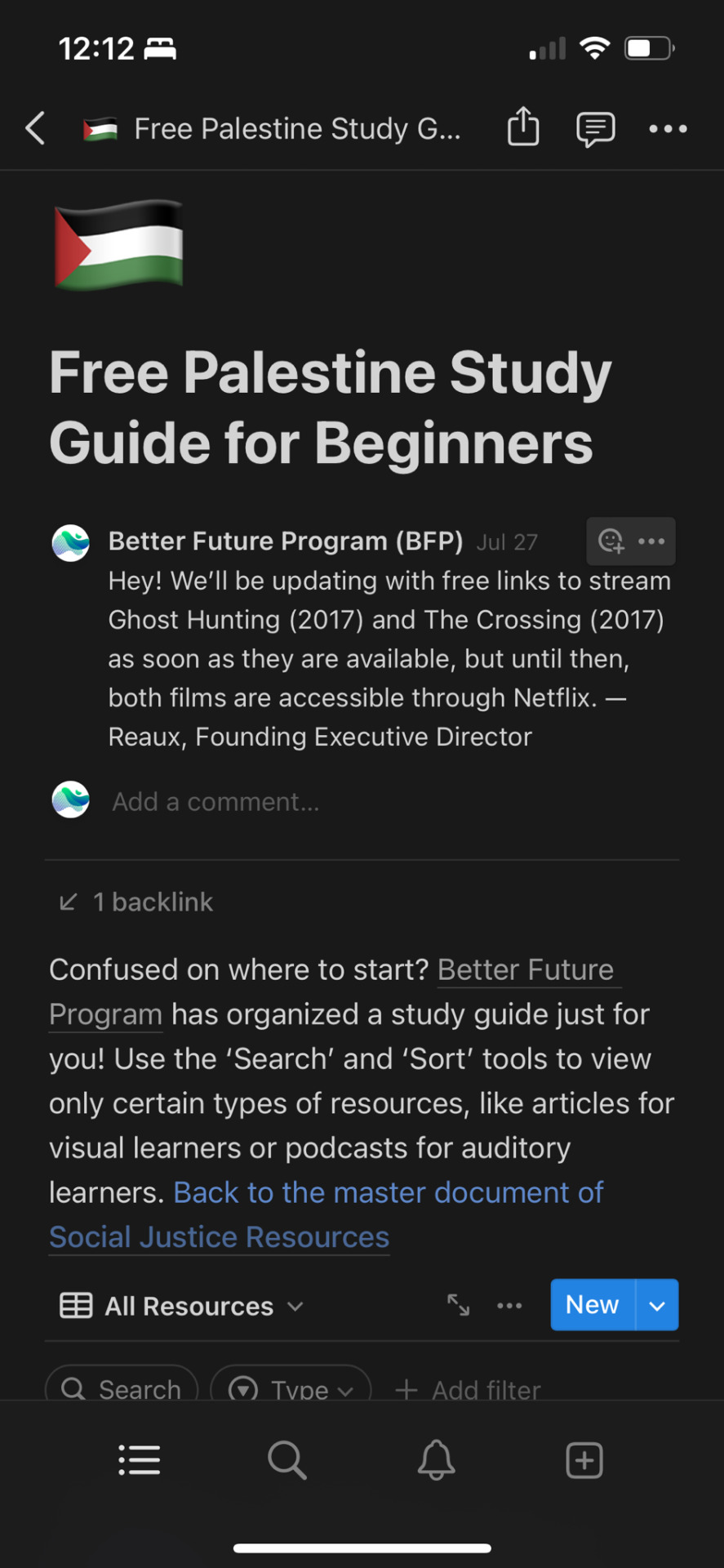
just wanted to remind everyone again not only of the 3,000+ resources offered through our Liberation Library but also of the study guides for beginners offered under each of our social justice topics!
resources can be organized by type (article, novel, podcast, video, etc.) as well as filtered and searched through. we’ve tried to make our system much more accessible than our former platform on google docs so this is such an exciting development to share with everyone.
please share to promote equitable access education!and if you’d like to volunteer with us, check out our open resources committee roles!
REBLOG THIS VERSION! image description by @bonesandblood-sunandmoon below the cut. thank you for writing one!
[Image Description: Six screenshots of beginner study guides on mobile view. The main text visible under each title reads:
Confused on where to start? Better Future Program has organized a study guide just for you! Use the ‘Search’ and ‘Sort’ tools to view only certain types of resources, like articles for visual learners or podcasts for auditory learners. Back to the master document of Social Justice Resources.
Five of the study guides have the start of a list of resources available with color coded resource types visible - Posts have a purple box, for example. Each study guide has an image. Prison/Policing Abolition has an image of chains, Organizing has two humanoid figures hugging, Classism and Anti-Capitalism has a stack of dollar bills, Anarchism has the red ‘A’ in a circle, Mad Studies has a yellow and orange capsule/pill, and Free Palestine has the flag of Palestine.
/End description.]
#reaux speaks#resources#educational equity#abolition#organizing#anti capitalism#anarchism#palestine#mad liberation#free palestine#israel
18K notes
·
View notes
Text


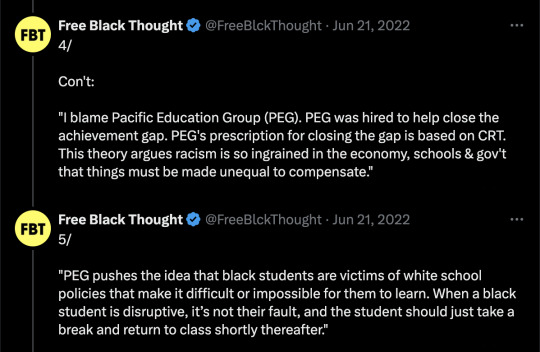
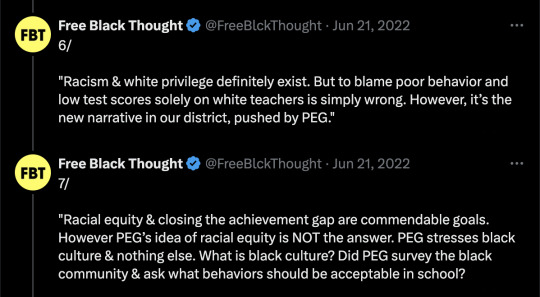
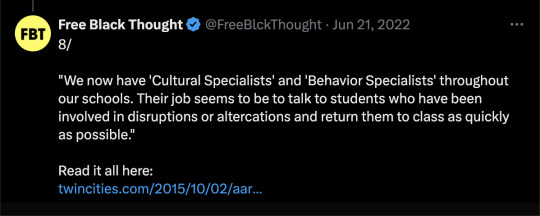
By: Aaron Benner
Published: Oct 2, 2015
I have been an elementary teacher almost all of my adult life, mostly in St. Paul Public Schools. First and foremost, I teach because I love kids, I love schools, I love our city, and I really love what happens when a group of kids becomes a community in a classroom and a school. For this to occur, everybody has to play a part — parents, students, teachers, building and district administration, and the broader community. As a black man, it breaks my heart to watch these communities fall apart and to see some children who look like me behave so poorly in our schools.
In 2011, I addressed the St. Paul School Board. At the time, I told them about my concerns with student behavior at Benjamin E. Mays Elementary School, where I taught sixth grade. I hoped to start a discussion about what I was witnessing. Although the media paid some attention (likely because my race made for an interesting story), the school board ignored me. I addressed the board again on May 20, 2014, regarding the same issues, but this time I was aware they were happening districtwide. Four other brave teachers accompanied me. The school board ignored us again and tried to paint us as anti-racial equity.
From 2013-15, I taught fourth grade at John A. Johnson Elementary (JAJ). The behaviors that I witnessed last year at JAJ were far worse than what I complained to the school board about in 2011 and in 2014. On a daily basis, I saw students cussing at their teachers, running out of class, yelling and screaming in the halls, and fighting. If I had a dollar for every time my class was interrupted by a student running into my room and yelling, I’d be a rich man. It was obvious to me that these behaviors were affecting learning, so when I saw the abysmal test scores this summer, I was not surprised. Out of 375 students, only 14.3 percent were proficient in Reading, 9.6 percent in Math and 9.3 percent in Science. These test scores are not acceptable in any way, shape or form.
I diligently collected data on the behaviors that I saw in our school and completed behavior referrals for the assaults. These referrals were not accurately collected. The school suspended some students, but many more assaults were ignored or questioned by administrators to the point where the assaults were not even documented. I have since learned that this tactic is widely used throughout the district to keep the numbers of referrals and suspensions low.
The parents who complained to the school board last year about behavior at Ramsey Jr. High know all too well about behaviors being ignored. The students of SPPS are being used in some sort of social experiment where they are not being held accountable for their behavior. This is only setting our children up to fail in the future, especially our black students. All of my students at JAJ were traumatized by what they experienced last year — even my black students. Safety was my number one concern, not teaching.
Who would conduct such an experiment on our kids? I blame the San Francisco-based consulting firm, Pacific Education Group (PEG). PEG was hired by SPPS in 2010 to help close the achievement gap. PEG makes no secret of the fact that its prescription for closing the gap is based on the Critical Race Theory. This theory argues that racism is so ingrained in the American way of life — its economy, schools, and government — that things must be made unequal in order to compensate for that racism. PEG pushes the idea that black students are victims of white school policies that make it difficult or impossible for them to learn. So, when a black student is disruptive, PEG, as I see it, stresses that it’s not their fault, and the student should just take a break, and then return to class shortly thereafter.
Racism and white privilege definitely exist, and there is not enough space in this paper for me to share all of the humiliating encounters I’ve experienced that are a product of racism. But to blame poor behavior and low test scores solely on white teachers is simply wrong. However, it’s the new narrative in our district, pushed by PEG.
I recently dropped out of the St. Paul School Board race to focus on my new job at a charter school, but I’m still concerned with the current state of SPPS and the direction of the school board. Here’s what I think should happen: First and foremost, the newly elected board must sever ties with Pacific Education Group. PEG has charged the taxpayers of St. Paul $3 million over the last five years. According to some reports, SPPS has matched PEG with $1.2 million. What are these matching dollars used for? It is crucial to understand that behaviors throughout the district have escalated to the point where we are at a crisis in St. Paul. PEG is not working. To add insult to injury, two weeks ago, the St. Paul School Board had the audacity to set the ceiling of next year’s tax levy 3.85 percent higher than the current year. Tax increase? This must be a joke.
Racial equity and closing the achievement gap, the correct way, are commendable goals. However, PEG’s idea of racial equity is NOT the answer. PEG stresses black culture and nothing else. What is black culture? Did PEG survey the black community of St. Paul and ask what behaviors should be acceptable in our schools? I don’t recall filling out any surveys or receiving any phone calls regarding this topic.
Because of PEG, we have forgotten about our Asian, Latino and Native communities. The St. Paul Public School district has the second most diverse school population in the country (New York City is ranked No. 1). For the record, Asians make up the largest minority group in our schools. PEG has influenced this district on major policy changes, from questionable behavioral guidelines and hiring practices to the creation of new positions with jargonistic titles.
We now have “Cultural Specialists” and “Behavior Specialists” throughout our schools. An overwhelming number of these specialists are black, and it’s not clear to me what their qualifications are. Their job seems to be to talk to students who have been involved in disruptions or altercations and return them to class as quickly as possible. Some of these “specialists” even reward disruptive students by taking them to the gym to play basketball (yes, you read that correctly). This scene plays out over and over for teachers throughout the school day. There is no limit to the number of times a disruptive student will be returned to your class. The behavior obviously has not changed, and some students have realized that their poor behavior has its benefits.
St. Paul Public Schools is in desperate need of true behaviorists to replace these “specialists.” Licensed therapists who are trained to help change and replace inappropriate behaviors. I expect that PEG would never go for this because it would contradict their excuse that “black culture” accounts for such behaviors. The newly elected school board can change that.
Another action the newly elected school board must take is to visit schools, listen to teachers, and offer them much-needed support. Teachers are currently fending for themselves when it comes to behavior concerns. Part of my frustration is with the leadership of the St. Paul Federation of Teachers. The union is so concerned with getting along with the district that they are paralyzed when the hundreds of teachers they represent bring up the issue of behavior. This needs to change.
PEG and SPPS are harming the very people whose interests they claim to represent. Follow the money. The taxpayers of St. Paul should demand to know who exactly is benefitting from PEG. Students definitely aren’t.
Aaron Anthony Benner works as the African- American Liaison/Behavior Coach and Community of Peace Academy, a public charter school in St. Paul.
--
By: Victor Skinner
Published: Sep 24, 2019
Aaron Benner, a black teacher from St. Paul, Minnesota, won a large settlement with the St. Paul School District last week over retaliation he faced for speaking out against the district’s race-based student discipline policies.
Benner argued the investigations came in retaliation for complaints to the school board about race-based student discipline policies implemented by then Superintendent Valeria Silva and promoted by President Obama. The discipline policies aimed to reduce suspensions of black students by lowering the expectations for behavior and increasing the threshold for suspensions, something Benner repeatedly, publicly argued was against the best interests of black students.
The “restorative justice” approach to student discipline was accompanied by “white privilege” teacher training sessions that cost the district taxpayers more than $3 million. Those sessions focused on the “white privilege” theory that the public education system is hopelessly stacked against black students, who shouldn’t be held accountable for poor academics or bad behavior.
In St. Paul and hundreds of schools across the country, the “white privilege” training sessions were conducted by Pacific Educational Group, also known as PEG.
“PEG was hired by SPPS in 2010 to help close the achievement gap. PEG makes no secret that its prescription for closing the gap is based on the Critical Race Theory. This theory argues that racism is so ingrained in the American way of life – its economy, schools, and government – that things must be made unequal in order to compensate for that racism,” Benner wrote in a 2015 editorial for the Press.
“Peg pushes the idea that black students are victims of white school policies that make it difficult or impossible for them to learn,” Benner wrote. “So, when a black student is disruptive, PEG, as I see it, stresses that it’s not their fault.”
Benner refused to accept that black students are less capable than their white classmates and left the school district in 2015. Benner taught at a local charter school and was later hired for a administration position at the St. Paul private school Cretin-Derham Hall, according to the Star Tribune.
After years of complaints from parents, teachers, administrators and others about violent and disruptive students running rampant with impunity, St. Paul school leaders eventually got rid of Silva and scrapped the failed student discipline policies.
Last week, the school board settled up with Benner, though the district denied any wrongdoing.
“This agreement enables the district to avoid the time, expense and uncertainty of protracted legal proceedings regarding its previous policies, practices and expectations,” board members wrote in a prepared statement.
The district contends taxpayers are responsible for $50,000 of the settlement, while its insurer will cover $475,000.
Benner told the Star Tribune he credits God for the favorable outcome.
“I thank God for all the blessings in my life,” he wrote in an email to the news site. “I turned 50 this year, got married in July and now (there is) this settlement.”
#Aaron Benner#diversity equity and inclusion#diversity#equity#inclusion#racial equity#white privilege#diversity training#educational equity#lower standards#bigotry of low expectations#neoracism#antiracism as religion#antiracism#racial discrimination#corruption of education#education#religion is a mental illness
38 notes
·
View notes
Text

#racism#white racial hatred#white supremacy#whiteness#anti-blackness#george floyd scholarship#civil rights act#discrimination#legal complaint#north central university#minnesota#educational equity
6 notes
·
View notes
Text
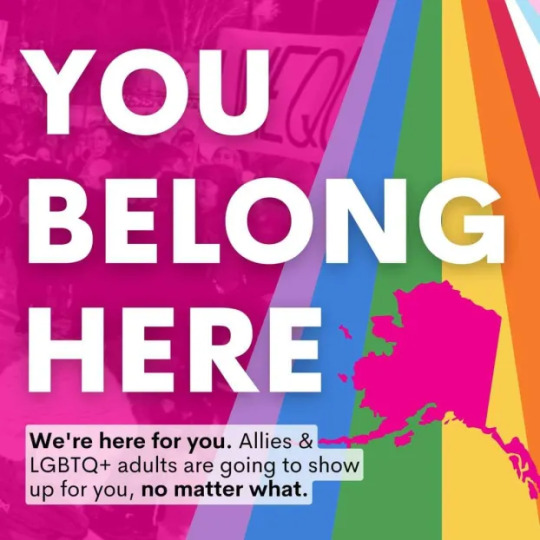
AN OPEN LETTER to STATE GOVERNORS & LEGISLATURES (ALASKA ONLY)
Reconsider HB 183 for Inclusive School Athletics
3 so far! Help us get to 5 signers!
HB 183, which proposes segregating school athletics based on biological sex, raises significant concerns about the potential harm it could inflict on children. This approach lacks scientific backing and may inadvertently subject students to invasive scrutiny, including the risk of inappropriate inspections. It is imperative that we prioritize the safety and well-being of all students above all else.
Moreover, HB 183 echoes past mistakes made by administrations that were overly focused on perceived threats from the LGBTQ community, while neglecting actual dangers within local communities. For instance, scandals involving institutions like the Catholic Church and the Boy Scouts of America highlight the grave consequences of such misguided priorities.
Therefore, I strongly urge reconsideration of HB 183. Instead of implementing policies that could harm vulnerable students, let us work towards fostering inclusive environments where all children can participate in sports with their peers, regardless of their sex. By promoting inclusivity and respect, we can create safer and more equitable opportunities for all students to thrive.
📱 Text SIGN PXZDHI to 50409
🤯 Liked it? Text FOLLOW IVYPETITIONS to 50409
💘 Q'u lach' shughu deshni da.
🏹 "What I say is true" in Dena'ina Qenaga
#ivy petitions#PXZDHI#ivy speaks#anti trans laws#SB 140#alaska politics#LGBTQ Community#protect trans kids#protect trans youth#protect trans rights#genital inspection#resistbot#open letter#Policy Reconsideration#Legislative Action#Student Advocacy#Progressive Policy#Equality In Sports#us politics#Child Safety#Student Wellbeing#Safety First#Educational Equity#Social Justice#Human Rights#Inclusivity#Respect For All#Gender Segregation#Vulnerable Students#american politics
3 notes
·
View notes
Text
Bridging the Opportunity Gap: Empowering Youth Through Education #writeapageaday @Blogchatter
Bridging the Opportunity Gap: Empowering Youth Through Education #writeapageaday @Blogchatter #EducationForAll #YouthEmpowerment #EducationalEquity #OpportunityGap #SocialJustice
Empowering Youth Through Education: My Passion for Bridging the Opportunity Gap
Introduction:As I reflect on my life journey, there’s one cause that resonates deeply within me – the empowerment of youth through education. Growing up, I witnessed firsthand the transformative power of education in shaping destinies and breaking the cycle of poverty. This ignited a passion within me to advocate for…
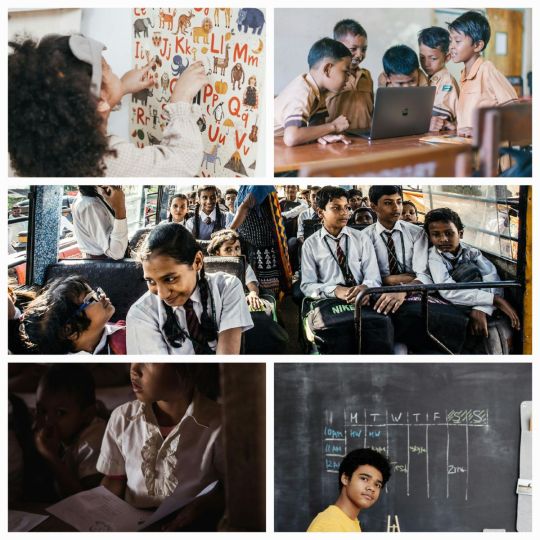
View On WordPress
0 notes
Text
Championing Inclusive Education in New Zealand: Navigating Risks and Strategies for Tertiary Institutions
Explore how inclusive education is shaping the future of tertiary education in NZ. Dive into challenges, strategies, and the impact on society. #InclusiveEducationNZ #EducationForAll 📚
Inclusive Education in New Zealand: Addressing Overlooked Tertiary Education Domains
In Aotearoa New Zealand, the realms of tertiary education extend far beyond traditional academic subjects, encompassing essential facets such as adult literacy and numeracy (LN), Māori cultural capability, Pacific cultural centredness, and support for neurodiversity. However, these crucial domains often find…

View On WordPress
#Accessibility in Education#Community Partnerships#Cultural Competency#Education#education reform#Educational Equity#educational innovation#Educational Policy#Graeme Smith#Inclusive Education#Literacy#Maori education#neurodiversity#New Zealand education#Numeracy#Pacific education#Social Mobility#Teacher Training#Tertiary Education
0 notes
Text
Empowering Students with Disabilities: Unraveling the Benefits of a 504 Plan
What is a 504 plan?
A 504 plan is a legal document that is utilized to furnish students with disabilities with the necessary accommodations and support to ensure equal access to education��It derives its name from Section 504 of the Rehabilitation Act of 1973, which prohibits discrimination against individuals with disabilities in programs receiving federal funding a 504 plan outlines the…
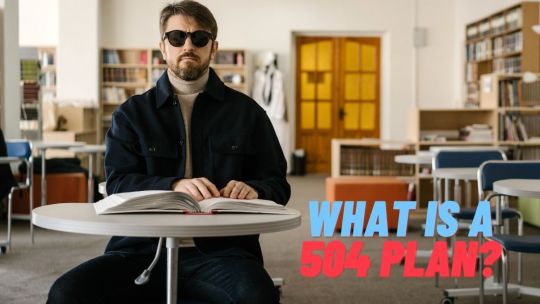
View On WordPress
#504 plan#504 plan education#504 plan meaning#Disability Accommodations#Education Support#Educational Equity#Equal Access#Inclusive Education#Section 504#Special Education#Student Rights#what is a 504 plan#what is a 504 plan in school
0 notes
Text
Join Dr. Almitra Berry as she shares powerful insights into empowering schools through bold leadership and harnessing the transformative force of parent power for achieving equity. Discover the key strategies, innovative approaches, and practical steps to foster a culture of empowerment and inclusivity in educational institutions. Explore the crucial role of strong leadership and the collaborative partnership between parents and schools in driving positive change. Don't miss this enlightening conversation that will ignite your passion for educational equity!
#youtube#dr. berry#Creating Change: Empowering Schools through Bold Leadership and Parent Power for Equity#Empowering schools#Bold leadership#Achieving equity#Educational institutions#Culture of empowerment#Inclusivity in education#Educational equity#Empowering educators#Empowering students#Equity in education#Educational policy#Educational empowerment#Effective school practices#Parent power#CreatingChange#Empowering Schools: Bold Leadership#Parent Power for Equity
0 notes
Text
0 notes
Text
Trans Reads is an ambitious project created by and for transgender people to openly access writing related to our communities. We believe education should be free and writing shouldn’t be behind a paywall. Transreads.org provides the opportunity to access, discuss, and distribute texts for free.
If you’re looking for books, chapters, texts, essays, or articles by, for, or about people who transverse or transcend western gender norms, you’re in the right place!
Trans Reads was formed through the work, consulting, and creativity of an anonymous group of trans people of various genders and races around the U.S. involved in organizing, academia, and trans liberation efforts. Trans Reads was launched in 2019 following increasing violence against trans people alongside the lack of accessible resources for trans people to learn about our own community.
There is a serious barrier for most trans people accessing content from our community. Trans people on average have less disposable income, time to read and purchase literature, and knowledge of the available texts. We created Trans Reads to address this problem directly. We offer the largest collection of free trans texts on the internet.
Get Involved:
Trans Reads is almost entirely generated through user content. By uploading, you can help a trans teen in a rural area learn about other girls like her. You could help a trans student who can’t afford a textbook easily pass their class. You can even share your own writing with the world on an easy-to-use platform exclusively for trans content. You can help grow our collection on our upload page. If you are interested in helping us upload texts for our collection, you can reach out on our contact page.
Ethics:
We are faced with the common ethical question about hurting the sales of trans authors. However, the largest ever study on piracy actually found that the piracy of copyrighted books, music, video games, and movies has no effect on sales. In the case of video games, piracy actually helped sales. As far back as 2002, we can see piracy boosting sales of media. Trans Reads strongly encourages you to purchase the books that you enjoy here or find other ways to support the author.
Academic authors rarely – if ever – see income from sales of their books, articles, or chapters. Most want to remove the paywalls withholding their content. Trans Reads is open to collaborating with authors, publishers, and journals on making this a possibility through our website.
History:
In 2014, Leslie Feinberg published the 20th-anniversary edition of Stone Butch Blues, one of the most influential works of transgender literature. The novel was a way for trans, gender nonconforming, and queer people to realize ourselves. It told us we aren’t alone. However, when the publisher went bankrupt, Leslie had to struggle to regain ownership over hir own novel.
“I had to work to recover my rights to Stone Butch Blues. When the first publisher went into Chapter 11 court, I had to spend thousands of dollars of my wages on legal fees to recover the right to this novel… While very ill in Spring 2012, I recovered my rights again.”
Ze didn’t want the book to be released as a film adaptation exploiting hir story for straight fantasies. Ze also used the opportunity to make the book more accessible. First editions shot up into hundreds of dollars. The least expensive print versions are still over $30 on Amazon. This simply isn’t affordable to most queer and trans people. The fight ended with Leslie publishing hir novel on hir website as a PDF, a strategy of reclaiming transgender narratives from greedy publishes by collective ownership of the text.
Trans Reads is dedicated to the memory of Leslie and all those who feel alone. Most individuals don’t have institutional access and cannot afford to pay for texts. Transreads.org allows visitors to effortlessly read texts by, for, or related to trans people online for free as PDFs. Trans Reads is the space where anyone can easily discuss, add, or download trans content.
This project is intended to foster discussion around the current state of learning. We refuse paywalls and withholding education. Trans Reads provides the opportunity to access, discuss, and distribute texts related to our community on its website in a matter of seconds.
Knowledge, learning, and community must be de-commodified for our collective liberation. Take it from Leslie:
“And on the day those paper deeds of ownership are torn up, it won’t matter about protecting Stone Butch Blues anymore from commercial exploitation.”
Authors shouldn’t live in fear of their work being exploited or inaccessible. Trans Reads is just one small part of trans autonomy from corporate publishers. However, it is a necessary step toward engaging with our radical history, politics, and futures.
Click here to upload a text.
363 notes
·
View notes
Link
By: Ian Rowe
Published: Jun 4, 2022
As a charter school leader in the South Bronx for the past decade, I’ve seen what happens when resources are forcibly removed from the “privileged” and given to the “unprivileged” in the pursuit of “equity” over “equality.”
The problem with equity — defined as equal outcomes for students from varied identity groups — is that it inevitably denies the role of individuality. Rather than support students’ assets and abilities, “equity” limits them by race and opportunity.
Proponents of equity over equality view this status quo as a struggle between the inherently advantaged and the inherently disadvantaged, the “marginalized” and the “non-marginalized,” the victimizers and their victims.
What’s missing here, however, are the students themselves. Rather than focus on individual needs and outcomes, equity advocates merely count and sort — with little regard for uniqueness, humanity or agency. And nowhere is this more apparent than in the pursuit of racial equity.
A bill signed last year by Oregon Gov. Kate Brown, for instance, suspended reading, writing and math proficiency requirements for graduating high-school students. By lowering standards, the governor’s office said the law would help Oregon’s “Black, Latino, Latinx, Indigenous, Asian, Pacific Islander, Tribal, and students of color.”
The Oregon effort is but one example of wrong-headed “antiracist thinking” in education. Take the Evanston school district outside of Chicago. Over the past few years, the district implemented a long list of discriminatory “antiracist” policies, including re-opening schools for in-person learning to students of color before white students. While intended to improve minority outcomes, it was actually an example of the exact type of race-based – if not racist — decision-making we should all be working against.
As one mother of a black 11-year-old Evanston student said: “My son has wanted to be a lawyer since he was 11. Then one day he came home and told me, But Mommy, there are these systems put in place that prevent Black people from accomplishing anything.’”
A similar sense of defeat can be reinforced by antiracist curricula. Research by Eric Kauffman, professor of politics at the University of London, for instance, found that reading even a brief passage from Ta-Nehisi Coates’ “Letter to my Son” — which paints America as a nation built on a history of oppression —“was enough to reduce black respondents’ sense of control over their lives.” And this lack of control can easily extend far beyond the classroom.
Similarly, David Quinn at the University of Southern California found that content emphasizing the achievement gap between black and white students caused many adults to underestimate the capabilities of black students. Rather than boost minority outcomes, the focus on “gaps” — instead of potential or achievement — actually reinforced the notion that individual effort cannot compete against systemic barriers.
Educators often have both high expectations and deep empathy for students whose home life or economic status infiltrate the classroom. Which is why in the schools I run — many in low-income communities — these students are being equipped to defy, rather than confirm, diminished expectations. We refuse to believe these kids lack opportunity, nor do we want them to believe this themselves. The whole reason to run schools, especially in lower-income communities, is to help students triumph from victimhood to victory. At our Vertex Partnership Academies high school opening in August in The Bronx, for instance, students will be able choose either a traditional college pathway or a two-year careers course offering industry credentials in computer science, health care, construction/architecture or media. Tailoring education opportunities to student needs better positions them for successful careers.
Across America, parents need to fully understand what’s at stake when antiracist dogma enters the classroom. Rather than expand opportunities, it almost inevitably leads to two potential outcomes: 1) black students must equal the performance of white students, or (2) black success equals the percent of black representation in the population. While both may sound logical, they actually place a ceiling on black potential.
I am against racism, but I am not “antiracist” — at least not the way “antiracist” is defined in mainstream progressive circles. I also believe that the most effective way to confront bigotry is not with more bigotry. Yet this is exactly what happens every time we reduce students and faculty to their race or gender. We focus on the insurmountability of systemic racism, rather than empower young people to believe that they possess the power — and, yes, agency — to surmount it.
==
When activists implement their own personal racist bigotry of low expectations as official public policy.
#Ian Rowe#equity#educational equity#equity vs equality#equality vs equity#agency vs equity#equity vs agency#individual agency#education#corruption of education#bigotry of low expectations#antiracism#antiracism as religion#wokeness as religion#cult of woke#woke activism#wokeism#woke#religion is a mental illness
15 notes
·
View notes
Photo

Representation is more important than ever, especially for the kids who are most marginalized.
Digital illustration of an older Latina teacher wearing an apple print dress. She’s standing in front of a blackboard that says, ‘inclusive curriculums benefit all students.’ There’s a variety of items around the image, including a pride flag, Black lives matter sign, globe, and plant.
#art#feminism#feminist#teacher#education#trust teachers#fund education#dei#inclusive#inclusivity#equity#inclusion#diversity equity and inclusion#teacher training#queer kids#kids#school#crt
469 notes
·
View notes
Text

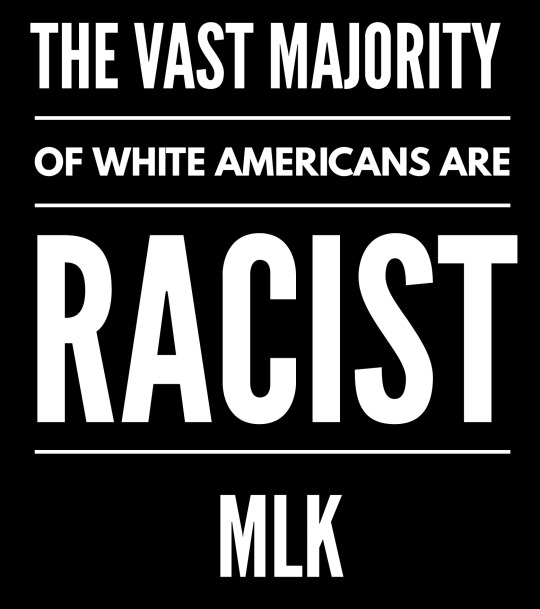
#white supremacy#racism#social justice#equality#end hate#anti-racism#racial equality#stop racism#no to hate#dismantle racism#DEI#diversity#equity#and inclusion#Republican lawmakers#anti-DEI bills#legislative push#George Floyd#protests#conservative media#constitutional concerns#Florida#Texas#Utah#bans#higher education#public offices#Board of Education#state-funded colleges#universities
58 notes
·
View notes
Text
I’m so fucking tired of hearing news sites explain how higher education levels are linked with voting a particular way, but then treating it as some isolated fun fact and never asking why. Like the ABC discusses how higher education is a huge predictor of voting yes to the voice, and then it just leaves it at that.
WHY DO YOU THINK THAT IS, HUH? I wonder why having more knowledge, more exposure to other views, and more critical thinking skills makes you do things like support the voice and support progressive policies???? I wonder what that says about the opposite, that you tend to be less educated to support conservative causes??? Gee, isn’t it a fucking MYSTERY??
#孟珏 life talk#voice to parliament#auspol#Australia#obviously this isn’t about access and equity issues#that’s a whole other problem#but I’m sick of no one asking why education might make you think critically about how society should be inclusive#and why conservative politics relies so much on a lack of education in its supporters
78 notes
·
View notes
Text
I have been very critical at the way that media has helped legitimize what essentially is a propaganda campaign. We need to call that what it is.
We know the actors. The actors are very explicit. They don't camouflage what they're doing.
In fact, one of the biggest actors, of course, Chris Rufo, regularly goes on Twitter and says, this is what we're going to do. He said he was going to turn critical race theory into a term that made white Americans think about indoctrination, their white children being treated as the oppressor. I mean, he lays it out, and then he lays out his strategy, which is we keep pushing this until we get some mainstream media to pick it up, and then the rest of mainstream media feels that they have to now pick it up or it will look like they're being biased.
So these folks have studied, I think, really the flaws in media and have exploited it. So what happens is this desire to be ‘balanced’ then actually means we obfuscate the truth.
The first thing we should have done as journalists is said, okay, show me in a classroom where this is happening.
Provide evidence that this is happening.
Let's define what Critical Race Theory is, and what it isn't.
And instead, we allowed bad faith actors to really define the terms in a way that I think has been very harmful because that's how propaganda works.
Attempted bans were against 1619 specifically. Then they came back with critical race theory. Now, of course, they're coming back with DEI and we just keep making kind of those same mistakes again and again.
I also just want to add that when we think about something like critical race theory, when we think about what should and shouldn't be taught in the classroom, part of what we did as a failure media is to ask what is the role of an education? And is it wrong to teach a theory? Is it wrong to teach things that every parent wouldn't agree with?
I mean, that is actually the role of an education.
—Nikole Hannah-Jones: The Attack on Black History
#politics#republicans#education#racism deniers#nikole hannah jones#erasure#diversity equity and inclusion#d.e.i.#racism#anti blackness#white supremacy#white fragility#media bias#1619 project#journalism fail#book bans#book banning#white grievance#white guilt#whitewashing history#aversive racism#colorblind racism#revisionist history#rightwing propaganda#crt#critical race theory
35 notes
·
View notes